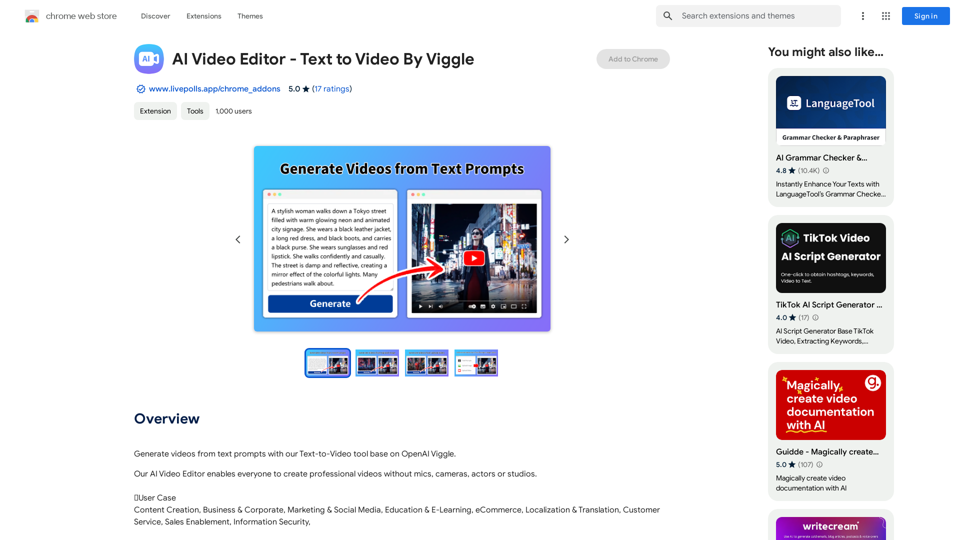Image Describer is a free AI image description tool that transforms images into detailed and accurate descriptions using advanced AI technology. It supports various functionalities such as image classification, tag generation, sentiment analysis, and story generation, making it a powerful asset for content creation and productivity enhancement.
Image Describer - Free AI Image Description Tool, Allowing Every Image to Communicate
Image Descriptor is a free AI tool that identifies and describes the contents of images. Generate accurate, detailed image descriptions effortlessly.

Introduction
Feature
-
Multi-dimensional Image Analysis
Users can upload images for comprehensive analysis, including object recognition, text extraction, and mood analysis.
-
Smart Analysis
The AI provides context-aware descriptions that capture important details in images, ensuring accuracy and precision.
-
Lightning Fast Processing
Instant image descriptions are generated through a high-performance AI processing system.
-
Multi-Language Support
Descriptions can be generated in multiple languages, catering to a global audience.
-
Enhanced Accessibility
Detailed image descriptions improve content accessibility for all users.
-
Powerful Image Analysis Tools
Features include object detection, scene understanding, emotion analysis, and copy suggestions for marketing.
How to Use?
- Visit the Image Describer website and log in or sign up for an account.
- Click on the "Upload Image" button to select an image from your device.
- Choose the type of analysis you want to perform from the available templates.
- Review the analysis results, which will include detailed descriptions and suggestions based on the image content.
- Utilize the generated descriptions for content creation, marketing, or social media posts.
FAQ
What is Image Describer?
Image Describer is an AI-powered tool that generates detailed descriptions of images, enhancing content creation and accessibility.
What types of analysis does Image Describer provide?
The tool offers various analyses, including object recognition, sentiment analysis, text extraction, and story generation.
Who can use Image Describer?
Image Describer is suitable for content creators, marketers, educators, and anyone needing detailed image descriptions.
How accurate is Image Describer's emotional analysis?
The emotional analysis feature is designed to be highly accurate, capturing the mood and atmosphere of the images effectively.
Are the images uploaded to Image Describer secure?
Yes, the platform prioritizes user privacy and ensures that uploaded images are handled securely.
Price
- Free plan: $0/month
The price is for reference only, please refer to the latest official data for actual information.
Evaluation
- Image Describer excels in providing detailed and context-aware descriptions, making it a valuable tool for content creators and marketers.
- The multi-dimensional analysis capabilities enhance productivity by automating tasks such as tagging and copy generation.
- However, the tool may require further improvements in the accuracy of emotional analysis and scene understanding to cater to more complex image scenarios.
- Overall, Image Describer is a practical solution for enhancing image content management, but users may need to supplement it with additional tools for comprehensive analysis in specialized fields.
Related Websites
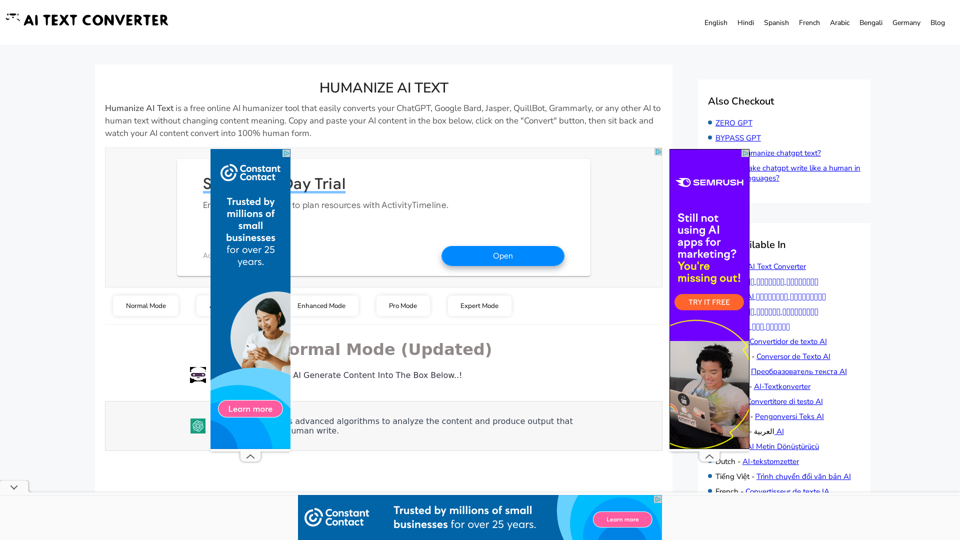
Humanize AI Text - Convert AI to Human-Like Text Instantly Are you tired of robotic AI-generated content that lacks the personal touch? Do you want to breathe life into your AI-written text and make it sound more human? Look no further! Our AI humanizer tool is here to help you convert your AI text into engaging, natural-sounding content that resonates with your audience. How Does it Work? Our advanced AI humanizer uses sophisticated algorithms to analyze your AI-generated text and identify areas that need improvement. It then applies a range of linguistic and stylistic adjustments to make your text more relatable, conversational, and authentic. The result is a rewritten text that sounds like it was written by a human, not a machine. Benefits of Humanizing AI Text * Increased Engagement: Human-like text is more likely to capture your audience's attention and keep them engaged. * Improved Credibility: Authentic-sounding content builds trust and credibility with your readers. * Enhanced Readability: Our AI humanizer ensures that your text is easy to read and understand, making it more accessible to a wider audience. Try Our AI Humanizer Today! Don't settle for robotic AI-generated content. Convert your AI text into human-like content that resonates with your audience. Try our AI humanizer tool now and see the difference for yourself!
Humanize AI Text - Convert AI to Human-Like Text Instantly Are you tired of robotic AI-generated content that lacks the personal touch? Do you want to breathe life into your AI-written text and make it sound more human? Look no further! Our AI humanizer tool is here to help you convert your AI text into engaging, natural-sounding content that resonates with your audience. How Does it Work? Our advanced AI humanizer uses sophisticated algorithms to analyze your AI-generated text and identify areas that need improvement. It then applies a range of linguistic and stylistic adjustments to make your text more relatable, conversational, and authentic. The result is a rewritten text that sounds like it was written by a human, not a machine. Benefits of Humanizing AI Text * Increased Engagement: Human-like text is more likely to capture your audience's attention and keep them engaged. * Improved Credibility: Authentic-sounding content builds trust and credibility with your readers. * Enhanced Readability: Our AI humanizer ensures that your text is easy to read and understand, making it more accessible to a wider audience. Try Our AI Humanizer Today! Don't settle for robotic AI-generated content. Convert your AI text into human-like content that resonates with your audience. Try our AI humanizer tool now and see the difference for yourself!Humanize AI Text is a free online tool that converts AI-generated text into human-like text, helping to evade AI detection and improving the quality of your writing to match that of a human.
157.34 K
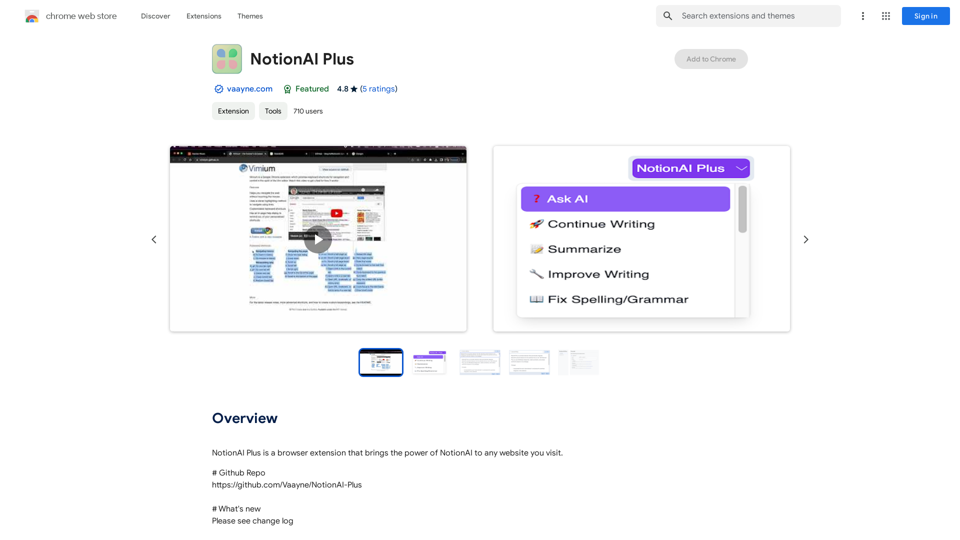
NotionAI Plus is a browser extension that brings the power of NotionAI to any website you visit.
193.90 M

Musick.ai: Free AI Music Generator & AI Song Maker Online
Musick.ai: Free AI Music Generator & AI Song Maker OnlineExplore Musick.ai as an innovative AI Music Generator, including music theory and music plaza. Create songs with AI and make AI music now!
57.04 K
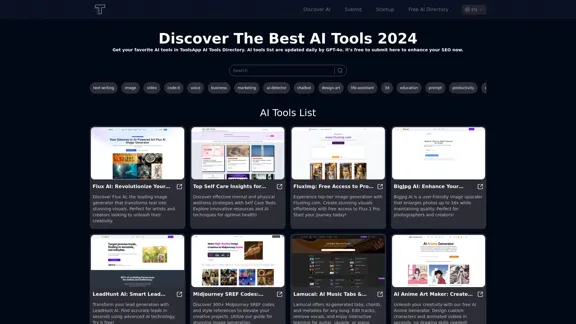
Get your top AI Tools | ToolsApp AI Tools Directory
Get your top AI Tools | ToolsApp AI Tools DirectoryToolsApp AI Directory is a tool that provides a free directory of AI tools. Find your favorite AI tools with ToolsApp AI Directory. ToolsApp AI Directory aims to gather all AI tools and offer the best options for users.
0

Create stunning, professional headshots for free with our AI Headshot Generator. Perfect for LinkedIn and resumes. Try it now!
0
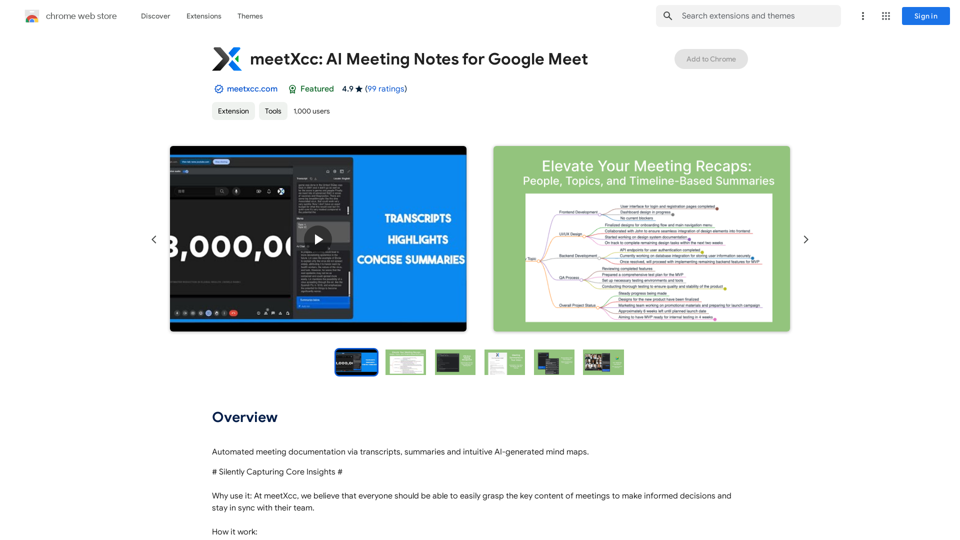
Automated meeting documentation via transcripts, summaries and intuitive AI-generated mind maps.
193.90 M

AI Character Generator (free, no sign-up, unlimited)―Perchance AI
AI Character Generator (free, no sign-up, unlimited)―Perchance AIAI text to image generator. Generate AI art from text, completely free, online, no login or sign-up, no daily credit limits/restrictions/gimmicks, and it's fast. Other AI art generators often have annoying daily credit limits and require sign-up, or are slow - this one doesn't. Use this AI to generate high quality art, photos, cartoons, drawings, anime, thumbnails, profile pictures, and more. Create original characters, anime characters, AI villains, fanfiction artwork, and pretty much anything else. It's an AI-based image generator that uses the Stable Diffusion text-to-image model. No watermark, no signup/login, unlimited images. Type words, make pics.
199
